英语人教版八年级下册一、情态动词 should的用法 情态动词should有自己
- 格式:docx
- 大小:10.86 KB
- 文档页数:2

新人教版|八年级下册英语所有知识点大汇总!Unit1 what' s the matter?1. It’s +形容词+ for sb. + to do sth. 做某事对某人来说是…的。
It’s important to do sth. 做某事很重要。
It’s important for me to eat a balanced diet. 平衡饮食对我来说是很重要的.It’s easy to do sth. 做某事是容易的。
It’s easy for us to find out the answer. 找出答案对我们来说是容易的。
2. 情态动词should的用法should是情态动词,它的基本用法是必须和其他动词一起构成谓语。
意为"应该......"。
should(应当,应该)用于所有人称,表示劝告或建议。
eg. ---I have a very bad cold. 我感冒很厉害。
---You should lie down and have a rest. 你应该躺下,多喝水。
3. maybe与may be(1)maybe是副词,译为“也许、可能”,相当于“perhaps”。
如:Maybe he can answer the question. 也许他能回答那个问题。
He maybe is from the USA, too. 他可能也来自美国。
(2)may be中的may为情态动词,译为“可能是......”。
如:He may be from the USA, too. 他可能也来自美国。
She may be our English teacher. 她可能是我们的英语老师。
4. few、a few、little、a little的区别和联系:(1)few / a few用来修饰可数名词,few表示否定意义,没有,几乎没有;a few表示肯定意义,有几个。
例如:He has few friends here, he feels lonely. 他这里没朋友,他感觉寂寞。
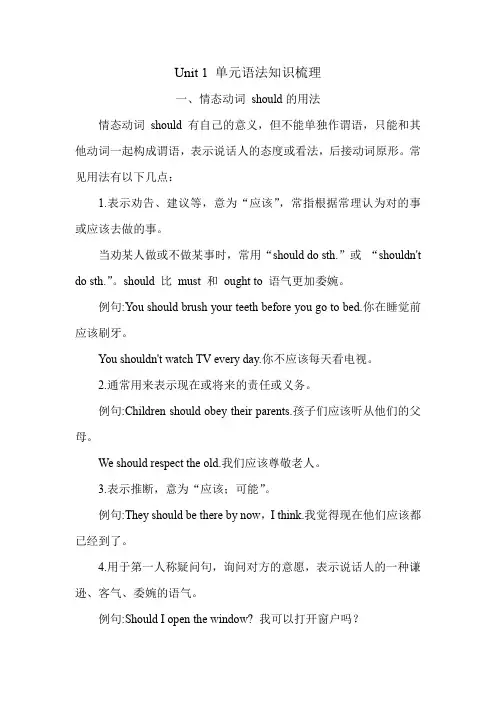
Unit 1 单元语法知识梳理一、情态动词should的用法情态动词should有自己的意义,但不能单独作谓语,只能和其他动词一起构成谓语,表示说话人的态度或看法,后接动词原形。
常见用法有以下几点:1.表示劝告、建议等,意为“应该”,常指根据常理认为对的事或应该去做的事。
当劝某人做或不做某事时,常用“should do sth.”或“shouldn't do sth.”。
should 比must 和ought to 语气更加委婉。
例句:You should brush your teeth before you go to bed.你在睡觉前应该刷牙。
You shouldn't watch TV every day.你不应该每天看电视。
2.通常用来表示现在或将来的责任或义务。
例句:Children should obey their parents.孩子们应该听从他们的父母。
We should respect the old.我们应该尊敬老人。
3.表示推断,意为“应该;可能”。
例句:They should be there by now,I think.我觉得现在他们应该都已经到了。
4.用于第一人称疑问句,询问对方的意愿,表示说话人的一种谦逊、客气、委婉的语气。
例句:Should I open the window? 我可以打开窗户吗?What should we do now? 我们现在该干什么呢?5.表示某种感情色彩,意为“竟会”,常用于以how, why开头引导的特殊疑问句中。
例句:Why should you be so early today? 你今天为什么会如此早?二、反身代词1.反身代词的构成反身代词是一种表示反射或强调的代词。
它由第一人称、第二人称的形容词性物主代词和第三人称代词的宾格加词尾-self或-selves构成。
其构成如下表:反身代词与它所指代的名词或代词形成互指关系,两者在人称和数上应保持一致。
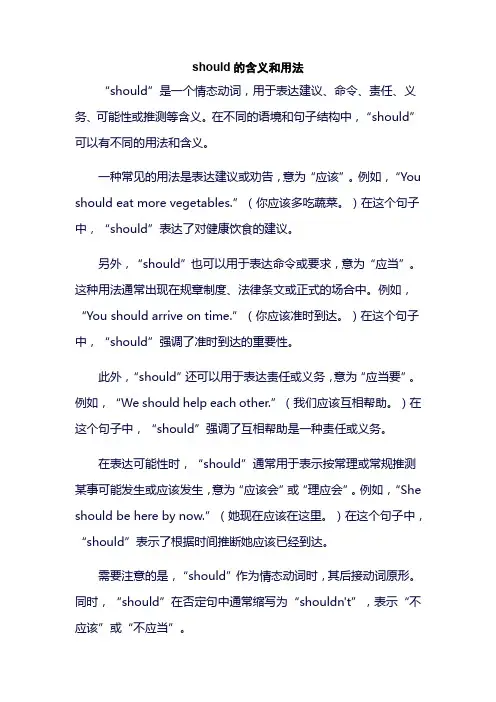
should的含义和用法“should”是一个情态动词,用于表达建议、命令、责任、义务、可能性或推测等含义。
在不同的语境和句子结构中,“should”可以有不同的用法和含义。
一种常见的用法是表达建议或劝告,意为“应该”。
例如,“You should eat more vegetables.”(你应该多吃蔬菜。
)在这个句子中,“should”表达了对健康饮食的建议。
另外,“should”也可以用于表达命令或要求,意为“应当”。
这种用法通常出现在规章制度、法律条文或正式的场合中。
例如,“You should arrive on time.”(你应该准时到达。
)在这个句子中,“should”强调了准时到达的重要性。
此外,“should”还可以用于表达责任或义务,意为“应当要”。
例如,“We should help each other.”(我们应该互相帮助。
)在这个句子中,“should”强调了互相帮助是一种责任或义务。
在表达可能性时,“should”通常用于表示按常理或常规推测某事可能发生或应该发生,意为“应该会”或“理应会”。
例如,“She should be here by now.”(她现在应该在这里。
)在这个句子中,“should”表示了根据时间推断她应该已经到达。
需要注意的是,“should”作为情态动词时,其后接动词原形。
同时,“should”在否定句中通常缩写为“shouldn't”,表示“不应该”或“不应当”。
总的来说,“should”是一个具有多种含义和用法的情态动词,可以用于表达建议、命令、责任、义务、可能性或推测等。
在具体使用时需要根据语境和句子结构来确定其正确的含义和用法。
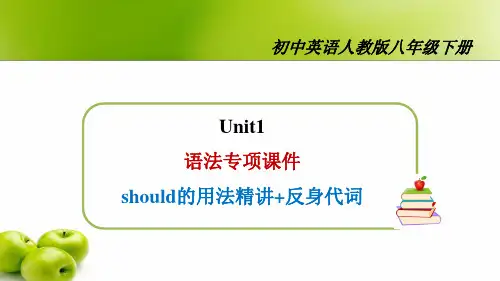
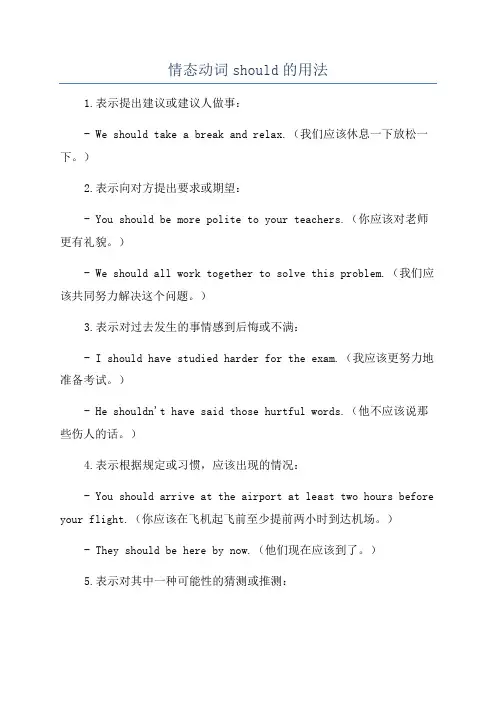
情态动词should的用法1.表示提出建议或建议人做事:- We should take a break and relax.(我们应该休息一下放松一下。
)2.表示向对方提出要求或期望:- You should be more polite to your teachers.(你应该对老师更有礼貌。
)- We should all work together to solve this problem.(我们应该共同努力解决这个问题。
)3.表示对过去发生的事情感到后悔或不满:- I should have studied harder for the exam.(我应该更努力地准备考试。
)- He shouldn't have said those hurtful words.(他不应该说那些伤人的话。
)4.表示根据规定或习惯,应该出现的情况:- You should arrive at the airport at least two hours before your flight.(你应该在飞机起飞前至少提前两小时到达机场。
)- They should be here by now.(他们现在应该到了。
)5.表示对其中一种可能性的猜测或推测:- Someone should be waiting for you at the hotel.(有人应该在酒店等你。
)- It should be sunny tomorrow.(明天应该是晴天。
)注意事项:- Should常与情态动词have连用,形成完成时态,表示对过去未实现的事情的惋惜或责备。
- Should的否定形式为should not或shouldn't,常缩写为shouldn't。
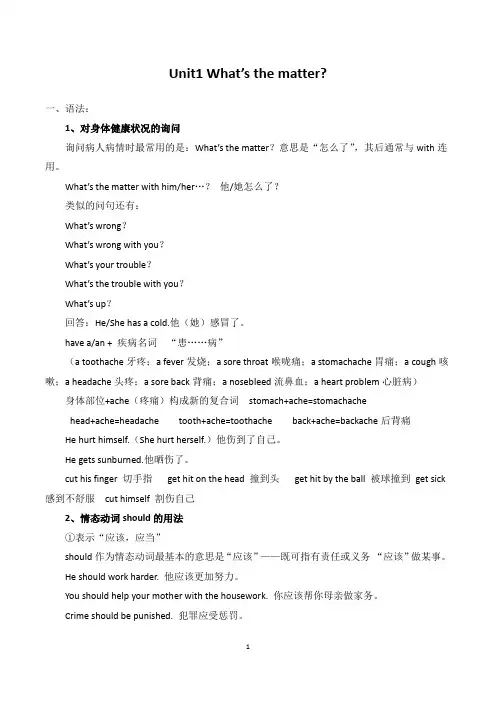
Unit1 What’s the matter?一、语法:1、对身体健康状况的询问询问病人病情时最常用的是:What’s the matter?意思是“怎么了”,其后通常与with连用。
What’s the matter with him/her…?他/她怎么了?类似的问句还有:What’s wrong?What’s wrong with you?What’s your trouble?What’s the trouble with you?What’s up?回答:He/She has a cold.他(她)感冒了。
have a/an + 疾病名词“患……病”(a toothache牙疼;a fever发烧;a sore throat喉咙痛;a stomachache胃痛;a cough咳嗽;a headache头疼;a sore back背痛;a nosebleed流鼻血;a heart problem心脏病)身体部位+ache(疼痛)构成新的复合词stomach+ache=stomachachehead+ache=headache tooth+ache=toothache back+ache=backache后背痛He hurt himself.(She hurt herself.)他伤到了自己。
He gets sunburned.他晒伤了。
cut his finger 切手指get hit on the head 撞到头get hit by the ball 被球撞到get sick 感到不舒服cut himself 割伤自己2、情态动词should的用法①表示“应该,应当”should作为情态动词最基本的意思是“应该”——既可指有责任或义务“应该”做某事。
He should work harder. 他应该更加努力。
You should help your mother with the housework. 你应该帮你母亲做家务。
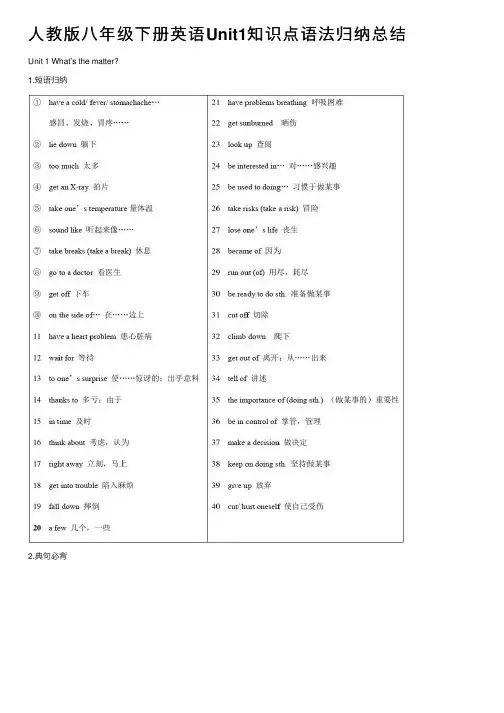
⼈教版⼋年级下册英语Unit1知识点语法归纳总结Unit 1 What’s the matter?1.短语归纳2.典句必背3.⽤法集萃(1)当别⼈⼼情不好,⾝体不适或遇到⿇烦时,我们可以⽤如下表达表⽰关⼼:?What’s the matter? What’s the matter with youWhat’s wrong with …What’s the trouble\problem with …(2)英语中常⽤have描述⾝体的不适,此时have意为“患有”,常⽤结构:①have a + 疾病例:have a cold 感冒;have a fever 发烧;have a cough 咳嗽②have a + ⾝体部位-ache例:have a headache 头痛;have a toothache ⽛痛③have a sore + ⾝体部位例:have a sore throat 咽喉痛;have a sore back 背痛(3)lie down躺下;tell lies/a lie 说谎(4)maybe & may be①maybe,“或许”,常⽤于句⾸,表⽰可能性,后加句⼦。
例:Maybe you are right.②may be,是情态动词+be的结构,意为“可能,也许”,后加名词、代词或形容词。
例:He may be angry.(5)sound like & sound①sound like+名词/代词/从句例:It sounds like you don’t know the truth. It sounds like a good idea.②sound+形容词,“听起来,好像”,例:The music sounds nice.(6)…when the driver saw an old man lying on the side of the road. ……这时司机看到意为⽼⼈躺在路边。

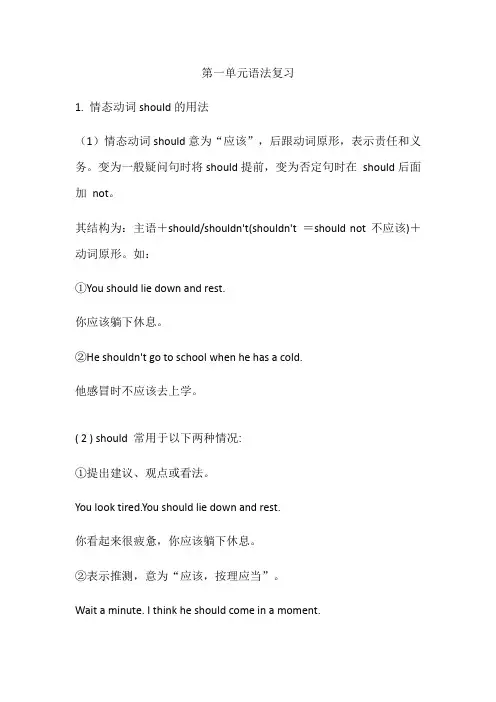
第一单元语法复习1. 情态动词should的用法(1)情态动词should意为“应该”,后跟动词原形,表示责任和义务。
变为一般疑问句时将should提前,变为否定句时在should后面加not。
其结构为:主语+should/shouldn't(shouldn't =should not不应该)+动词原形。
如:①You should lie down and rest.你应该躺下休息。
②He shouldn't go to school when he has a cold.他感冒时不应该去上学。
( 2 ) should 常用于以下两种情况:①提出建议、观点或看法。
You look tired.You should lie down and rest.你看起来很疲惫,你应该躺下休息。
②表示推测,意为“应该,按理应当”。
Wait a minute. I think he should come in a moment.请稍等一下,我想他应该马上过来。
【拓展】在英语中,表示建议的说法有很多,而且都是中考观察的重点。
主要结构有:①Would you like (to do) sth . ?你想要/愿意(做)某事吗?Would you like to play basketball with me?你想要和我一起打篮球吗?②Shall l/we do sth ?我/我们做,,好吗?Shall we go to the zoo tomorrow?明天我们去动物园,好吗?③Why not do sth ? 为什么不,,呢?Why not join us?为什么不加入到我们中间来呢?④How/What about doing sth ?做某事怎么样?How about going swimming?去游泳怎么样?⑤Let’s do sth让我们做,,吧。
Let ' s go home .我们回家吧。
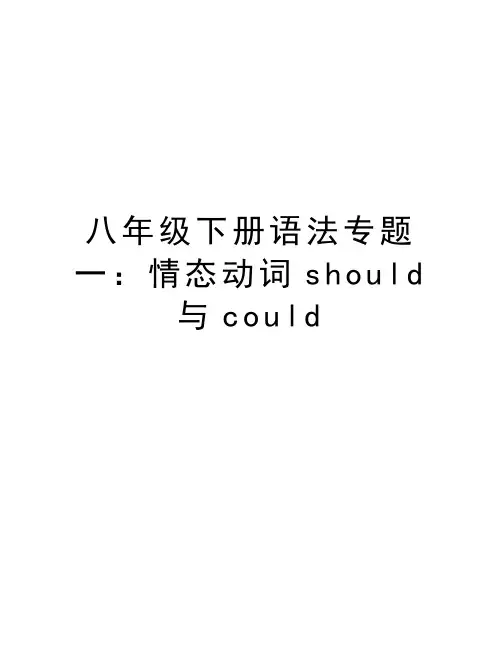
八年级下册语法专题一:情态动词s h o u l d与c o u l d专题归类复习一情态动词should与could的用法●语法讲解1.should是情态动词shall的过去式,但有时并不表示过去。
(1)表示委婉的劝告或建议,意为“应该”。
如:You should hand in your composition at once.你应该立刻交上你的作文。
(2)表示可能性或推断,意为“可能;应该”。
如:I think they should be there now.我想他们现在应该在那里。
(3)用于特殊疑问句中,表示意外、惊奇、不能理解等强烈感情。
如:How should you know that?你是怎么知道那件事的?What should you do to relax?你该做什么来放松呢?2.could是情态动词can的过去式,但有时并不表示过去。
(1)表示提议,比can更客气、委婉。
I could do the shopping for you, if you are tired.如果你累了,我能帮你买东西。
(2)表示请求,语气比can更客气、委婉。
Could you show me the way to the hospital?你能告诉我去医院的路吗?●语法精练Ⅰ.单项选择( )1.Schools________allow students at least one houra day for sports.A.would B.mightC.should D.could( )2.________you tell me how to get to the postoffice?A.Must B.NeedC.Could D.Should( )3.—When can I come for the photos? I need themtomorrow afternoon.—They________be ready by 12:00.A.can B.shouldC.might D.need( )4.—Could I borrow your dictionary?—Of course you________.A.can B.mustC.should D.will( )5.The basketball________his.He loves playingbasketball.A.maybe B.may beC.may is D.may not( )6.We________keep the new traffic law and learn how to protect ourselves.A.will B.wouldC.shall D.should( )7.—Could you please help me do my homework?—Sorry.I________.You________do it by yourself.A.could; mayB.couldn't; shouldC.can't; shouldD.can't; may( )8.—How was the youth club last night, Mark?—It was great fun.You________come.A.must B.canC.should D.mayⅡ.根据句意用should或could填空1.Sally________make dumplings by herself when she was only five years old.2.In school, all the classmates__________get on wellwith each other.3.You________call her if you have something important to tell her.4.You_________not drive after drinking.5._________I use your mobile phone,please?。
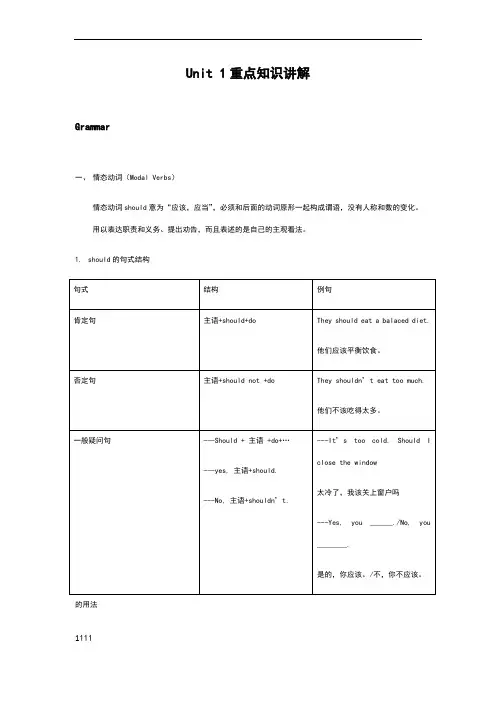
Unit 1重点知识讲解Grammar一、情态动词(Modal Verbs)情态动词should意为“应该,应当”,必须和后面的动词原形一起构成谓语,没有人称和数的变化。
用以表达职责和义务、提出劝告,而且表述的是自己的主观看法。
1.should的句式结构的用法注意:should在以why,who,how等疑问词开头的问句中,意为“竟然,居然,怎么会”,表示意外、惊喜或在说话人看来是不可思议的。
二、其他表示建议的句型三、反身代词表示反射或强调的代词叫做反身代词。
反身代词是由第一人称、第二人称形容词性物主代词或第三人称代词的宾格形式,词尾加self或selves组成。
反身代词可译“本人”、“本身”,为加强语气,也常翻译为“亲自”、“自己”。
不定人称代词one-----oneself.1、反身代词的分类2、反身代词的用法单词的用法Section A1.What’s the matter怎么了该句常用询问某人患了何种疾病或遇到了什么麻烦,其后用with引出对象。
1). What’s the matter with sb.=what’s wrong with sb.=what’s the trouble/problem with sb.=what’s one’s trouble/problem. What’s the matter with Tom=what’s _________ with Tom=What’s the _________ with Tom=What’s Tom’s _________2). matter, 名词,“问题,事情”. We have important _________(matter) to discuss.我们有些重要的问题要讨论。
3). 动词,“要紧,关系重大”. It dosen’t _________ that you came late.2.I have a cold.我感冒了。
情态动词should的基本用法引言情态动词是英语中一类特殊的动词。
其中,动词"should"在口语和书面语中广泛使用。
本文将介绍"should"的基本用法。
表示义务或责任1. 用于表达建议:"should"用于向对方提出建议或主张某种观点。
- 例如:"You should go to bed early if you want to be healthy."2. 用于表示义务、责任或固定规则:在特定情况下,"should"用于指示某人有义务或责任做某事,或根据某一固定规则进行行动。
- 例如:"You should apologize for your mistake." (表示道歉是一种道德责任)- 例如:"Visitors should not touch the exhibits." (固定规则:游客不应该触摸展品)3. 用于表示命令或指示:在特殊语境下,"should"可用于表达命令或指示。
- 例如:"You should stop talking and listen to me."表示推测或假设1. 用于表示推测:"should"可用于表达对某事的合理推测。
- 例如:"He should be at home by now." (合理推测:他现在应该已经回家了)2. 用于表示假设:在条件状语从句中,"should"可以表示假设或可能性。
- 例如:"If it should rain tomorrow, we will stay indoors."提醒或警示1. 用于提醒或警示:"should"可以用于提醒或警示某人注意某事,以免发生问题。
Unit 1 重点知识讲解Grammar一、情态动词(Modal Verbs)情态动词should 意为“应该,应当”,必须和后面的动词原形一起构成谓语,没有人称和数的变化。
用以表达职责和义务、提出劝告,而且表述的是自己的主观看法。
1.should 的句式结构2.s hould 的用法喜或在说话人看来是不可思议的。
二、其他表示建议的句型表示反射或强调的代词叫做反身代词。
反身代词是由第一人称、第二人称形容词性物主代词或第三人称代词的宾格形式,词尾加self 或selves 组成。
反身代词可译“本人”、“本身”,为加强语气,也常翻译为“亲自”、“自己”。
不定人称代词one ---- oneself.1、反身代词的分类2、反身代词的用法单词的用法Section A1.What’s the matter?怎么了?该句常用询问某人患了何种疾病或遇到了什么麻烦,其后用with 引出对象。
1). What’s the matter with sb.?=what’s wrong with sb.?=what’s the trouble/problem with sb.?=what’s one’s trouble/problem?e.g. What’s the matter with Tom?=what’s with Tom?=What’s the with Tom?=What’s Tom’s?2). matter, 名词,“问题,事情”e.g. We have important (matter) to discuss.我们有些重要的问题要讨论。
3). 动词,“要紧,关系重大”e.g. It dosen’t that you came late.2.I have a cold.我感冒了。
1).have/get/catch a cold “感冒,着凉”The old man a cold yesterday.那位老人昨天感冒了。
should(1)表“劝告、建议”时,可译成“应该”,这时可用ought to替换。
You should keep your promise.你应该遵守诺言。
Young people should learn how to use computers. 年轻人应该学如何应用计算机。
(2)表示委婉陈述自己的意见。
I should think you are right.我想你是对的。
I should advise you not to go now.我劝你现在别走。
(3)表示惊异赞叹、忧虑、惋惜、欢欣、不满等情绪。
Why should you think so?你为何这样想呢?(不满)It's strange that it should be so hot today.很奇怪,今天怎么这么热。
(惊奇)It's wonderful that you should have achieved so much in these years.这几年你们有了这样大的成绩,真了不起。
(赞叹)(4)表推测意为“可能,该”,表示对现在情况、将来情况的推测。
They should be home by now.他们现在应当到家了。
The book you need should be in our library.你需要的那本书我们图书馆应该有。
It’s nearly seven o’clock. Jack should be here at any moment.现在快要七点了,杰克随时会到。
-When can I come for the photos? I need them tomorrow afternoon. 我什么时候能取照片?明天下午要用。
- They should be ready by 12:00.明天12点前应该能冲好。
(5)“should+完成时”,在肯定句中,表示应完成而实际未完成的事情;如果用在否定句中,则表示发生了不应当发生的事件。
Unit1:What’s the matter?一.语法重点1.情态动词should的用法2.反身代词二.作文话题:谈论健康三.重要词汇句型1.have a +疾病名词(得了......病)2.询问病人病情的句型(也可用于发生了什么事)What’s wrong?What’s wrong with you?What’s your trouble?What’s the trouble with you?What’s wrong?3.4.If 引导的条件状语从句(主将从现)5.surprise:(1)surprise sb.吓到某人 (2)be surprised at对......感到吃惊 (3)be surprised to do sth.做某事令人感到吃惊 (4)in surprise惊奇地6.agree:(1)agree to do sth. 同意做某事(2)agree with sb. 同意某人(3)agree on sth.双方就某事达成一致(4)agree that+that从句同意......7.trouble:(1)get into trouble陷入困境(2)be in trouble处于困境(3)get sb. into trouble使某人陷入困境(4)have trouble with sth.在某事方面有困难(5)have trouble (in) doing sth.在做某事方面有困难e(1)be/get used to doing sth.习惯于做某事(2)used to do sth.过去常常做某事(3) sth. be used to do......某物被用来做(表被动关系)......(4)sth. be used for doing sth.某物用于/被用于做某事(强调用途)9.take a risk/take risks冒险at risk在危险中at the risk of doing sth.冒生命危险做某事10.run out(花光:物作主语) run out of(人作主语)=use up11.mean to do sth.打算做某事 mean doing sth.意味着做某事12.important(adj.)----unimportant(adj.不重要的)----importance(n.)13.be in control of 掌管,控制14.cut词组:1. cut out删除;删去 2. cut up切碎 3. cut off切掉;停止4. cut down砍到;降低5. cut in插嘴;超车;插队Unit2: I’ll help to clean up the city parks.一.语法重点1.动词不定式2.动词短语二.作文话题:提供帮助,义务活动三.重要词汇句型1.volunteer:v.自愿(做某事) volunteer to do sth. volunteer for sth.n. 志愿者adj. 志愿的;自愿的 a volunteer job2.疑问词+动词不定式=宾语从句I really can’t decide where I should go.=I really can’t decide where to go.3.such+a(n) +形容词+名词=so+形容词+a(n)+名词She is such a beautiful girl.=She is so beautiful a girl.4.satisfaction(n.满意)--satisfy(v.使满意)--satisfied(adj.满意的)--satisfying(令人满意的)to one’s satisfaction使/令某人满意/满足 be satisfied with对......感到满意 be satisfied to do sth. 对做某事感到满意5.raise...for...为...筹集...6.look like外表上看起来像 take after指因血缘关系在性格,性格,行为上相像7.make/think/find/believe/feel it +形容词+to do sth. 使/觉得/发现/相信/感觉做某事......8.make a difference to对......产生影响9.imagine: (1)imagine doing sth.想象做某事(2)imagine sb. to do sth.想象某人做某事(3)imagine that/what 想象......10.train: v. 训练 n. 火车 training n.训练;培训(1)train sb./sth. to do sth.训练某人/某物去做某事(2)train sb. in sth. 在某方面训练/培养某人11.understand=follow=catch理解;听懂understanding adj.善解人意的;体谅人的12.change v. 改变;变化 change one’s life change...into...n. 零钱(不可数名词)改变(可数名词changes)13.短语:cheer up (使)变得高兴;振奋起来give out分发;散发come up with想出;提出put off推迟hand out分发call up打电话给某人;征召care for照顾;非常喜欢try out 参加.....选拔;试用fix up修理;装饰give away赠送;捐赠take after(外貌或行为)像Unit3:Could you please clean your room?一.语法重点1.情态动词could用法(请求和征求许可)二.作文话题:对某事某物的看法(议论文)三.重要词汇句型1.in a mess乱糟糟;一团糟 make a mess of (doing) sth. 把(做)某事搞得一团糟2.so +助动词/系动词/情态动词+主语 (也)neither助动词/系动词/情态动词+主语 (也不)He will go to Hangzhou for a holiday tomorrow. So will I.3.pass v. 经过;穿过 pass the supermarket通过(考试;会议);合格或者及格 pass the final exam(时间的)过去,流逝 A year passed quickly.4.borrow sth. borrow sth. from sb. (借进:说话人向别人借东西)lend sb. sth. lend sth. to sb. (借出:说话人把自己的东西借给别人keep“借”或“保留”多长时间,与一段时间连用5.make:(1)make sb. do sth. I made my mother laugh.(2)make+宾语+形容词(宾语补足语) I made my mother sad.6.waste: a waste of 浪费 a waste of moneywaste sth.浪费某物 waste sth. in doing sth.浪费......做某事7.provide 提供;供应provide sb. with sth.= provide sth for sb.supply sb. with sth.=supply sb. with sth.offer sb. sth=offer to do sth.8.develop(v.发展)--developed(adj.发达的)--developing(adj.发展中的)--development(n.发展)develop one’s interest in培养某人对......的兴趣9.drop与fall 落下;掉下;降下(作不及物动词时,一般可互换)drop还可作及物动词,而fall 不可10.短语:depend on依靠;依赖take care of 照顾;处理Unit4: Why don’t you talk to your parents?一.语法重点1.提建议和回答提建议的表达方式2.until, so that及although引导的状语从句二.作文话题:就某一现象提建议三.重点词汇句型1.allow sb. to do sth.允许某人做某事allow doing sth.允许做某事2.find sb. doing sth.发现某人正在做某事 find sb. to do sth. 发现某人做了某事3.get on (well/badly)with sb. 与某人相处的好/坏4.argue with sb. about sth. 为某事与某人争论5. instead与instead of7.offer to do sth.主动提出做某事 offer sb. sth.=offer sth. to sb.给某人提供某物municate with sb.与某人沟通,交流communicate sth. to sb.把......通知/传达给某人9.return sb. sth= return sth. to sb.=give back10.not ...any more(不再)=no morenot...any longer=no longer(不再)11.put pressure on sb.向某人施压pete with/against sb.和某人竞争13.continue/go on doing sth.继续做同一件事continue/go on to do sth.继续做某事(不是同一件事)pare A with B把A与B做对比/比较(用来比较相似事物的不同点)compare A to B把A比作B(用来比较不同事物间的相同点)16.cause sb. to do sth.促使某人做某事cause sth. (to/for sb.)(给某人)带来......17. 词组:look through快速查看;浏览work out成功的发展;解决get on with和睦相处;关系良好cut out删除;删去compare...with比较;对比Unit5: What were you doing when the rainstorm came?一.语法重点1.过去进行时2.when与while的区别二.作文话题:描述过去发生的某件事三.重点词汇句型1.light: 1)n. 光;光线(不可数名词) 2)n. 电灯;光源(可数名词)3)adj.轻的;浅色的4)v. 点燃;照亮 light---lighted/lit---light/lit2.report v.报告 n. 报告 reporter n. 记者3.wood n. 木头;木(不可数名词)小树林(可数名词,常用复数)wooden adj.木制的4.beat 1)v. 击打 2)心脏等跳动 3)打败;战胜(后接人或由人组成的队)5.against 1)反对 for支持 We are against war and for peace.2)靠着,倚着 The boy stood against the door.6.rise与raise2)实现(梦想、愿望)realize one’s dream=make one’s dream come true=achieve one’s dream8.make one’s way to......在某人去......的路上,前往......途中9.短语:at first 起初;起先fall asleep进入梦乡;睡着die down逐渐变弱;逐渐消失make one’s way前往;费力地前进take down拆除,往下拽;记录go off水电断掉;离开;爆炸;食物变坏。
一、情态动词should的用法
情态动词should有自己的意义,但不能单独作谓语,只能和其他动词一起构成谓语,表示说话人的态度或看法,后接动词原形。
常见用法有以下几点:
1.表示劝告、建议等,意为“应该”,常指根据常理认为对的事或应该去做的事。
当劝某人做或不做某事时,常用“should do sth.”或“shouldn't do sth.”。
should 比must 和ought to 语气更加委婉。
例句:You should brush your teeth before you go to bed.你在睡觉前应该刷牙。
You shouldn't watch TV every day.你不应该每天看电视。
2.通常用来表示现在或将来的责任或义务。
例句:Children should obey their parents.孩子们应该听从他们的父母。
We should respect the old.我们应该尊敬老人。
3.表示推断,意为“应该;可能”。
例句:They should be there by now,I think.我觉得现在他们应该都已经到了。
4.用于第一人称疑问句,询问对方的意愿,表示说话人的一种谦
逊、客气、委婉的语气。
例句:Should I open the window? 我可以打开窗户吗?
What should we do now? 我们现在该干什么呢?
5.表示某种感情色彩,意为“竟会”,常用于以how, why开头引导的特殊疑问句中。
例句:Why should you be so early today? 你今天为什么会如此早。